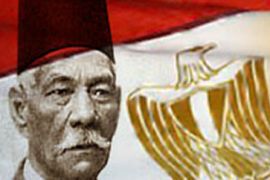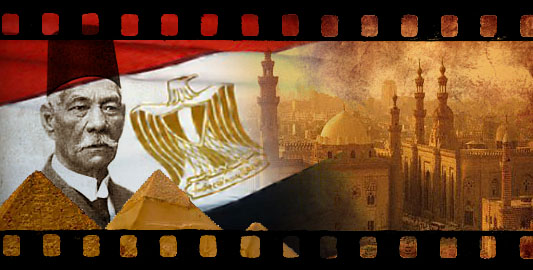Fathering Egyptian nationalism
Saad Zaghlul, described as a man of the people, had a vision for a free Egypt.

 |
| Saad Zaghlul is considered the father of the modern Republic of Egypt |
For more than 400 years, all Arabs – except for parts of Arabia and Morocco – were under Ottoman rule.
But the dismemberment of the Ottoman Empire after 1918 resulted in Arabs falling prey to identity conflicts and foreign domination, and prepared the stage for a surge of nationalistic feelings in the region.
Nations which had struggled under Ottoman occupation now found themselves occupied by the victors of World War I – Britain and France.
Contrary to traditional Islamic thought, nationalism – often called the religion of the modern world – divided what was considered a Muslim ummah (nation) into political entities based on shared characteristics, such as language and culture.
Thus, nationalism was seen as a new, imported idea.
It was in this context, marked by chaos and confusion, that Saad Zaghlul, a liberal reformist and later father of Egyptian nationalism stepped in, putting into action his modernist, liberal vision of an independent nation free from the yoke of British occupation.
Liberate Egypt
Zaghlul, who had studied Islamic law at Al-Azhar University, began his career as a public official when he was appointed the minister of education between 1906 and 1908 and the minister of justice between 1910 and 1912.
In 1913 he became vice-president of the Legislative Assembly.
It was during his tenure in government that he came to believe that independence could be achieved through legal and educational reform, an idea influenced by Abd al-Rahman al-Kawakibi and Sati al-Husi, two Arab nationalists who dominated regional politics in the 19th century.
Walid Kazziha, a professor of political science at the American University of Cairo, says Zaghlul was able to build on the principles established by other nationalists in the region.
“The foundations of nationalism in Egypt were originally based by Mustafa Kamel [a nationalist lawyer who called for British troops to leave], but Saad Zaghlul gave the nationalist movement a wider social dimension by engaging the urban masses,” Kazziha said.
But Mounir Fakhry, a senior member of the Wafd Party which was founded by Zaghlul in 1919, says there are significant ideological differences between Kamel and Zaghlul.
“While Saad Zaghlul belonged to Lutfi al-Sayyed’s school of thought, which advocated the slogan ‘Egypt for Egyptians’, Mustafa Kamel fought for Egypt’s independence within the framework of the Ottoman Caliphate.
“For Kamel, nationalism was merely about ending the British occupation, not establishing an Egyptian nation-state.”
The Wafd
As World War I came to an end, Zaghlul increasingly began to call for Egyptian independence from Britain.
He believed that the best opportunity to present Egypt’s case would come at the Paris Peace Conference of January 1919 in which the victors of the war were to negotiate peace treaties with the defeated powers.
Zaghlul formed a delegation – the Arabic term, al-wafd – to head to Paris, but the British authorities in Egypt arrested and exiled him to Malta.
If the British had hoped to extinguish the flames of nationalism, his arrest came as a bitter disappointment to them.
Of the people
The exile of Zaghlul – “the uncrowned king of the peasants” as described by the Austrian journalist Wolfgang Michel – unleashed fierce Egyptian anti-British sentiment, resulting in huge demonstrations and riots in what came to be known as the 1919 Revolution.
The British had failed to factor in Zaghlul’s popularity with ordinary Egyptians.
Raised in a rural environment, Zaghlul was gifted at communicating with ordinary Egyptians. He combined anti-British sentiment with the concept of the nation to form a nationalist movement.
Kazziha said: “The nationalist movements had until then consisted mainly of army officers … it consisted of lawyers and Effendis. Zaghlul, however, managed to transform it into a popular movement, in which the Egyptian peasantry participated heavily.”
Zaghlul also stressed Muslim-Christian unity, an idea that would heavily influence other Arab nationalist movements.
“Zaghlul managed to break class boundaries, turning the nationalist movement into a comprehensive, popular movement that combined all religious and social groups … he strengthened Muslim-Coptic Christian ties,” Kazziha said.
In his 3000-page-autobiography, which he wrote shortly before his death, Zaghlul spoke at length of his relationship with the ordinary Egyptian people: “The British and the legal authority represented by the Khedive failed me. But, the simple, ordinary Egyptian people are the ones who supported me.”
Victory from defeat
Released after 800 Egyptian deaths in riots protesting his arrest, Zaghlul and the Wafd reached Paris and were disappointed that their calls for independence fell on deaf ears.
The British kept up the pressure and re-arrested and exiled Zaghlul to the Seychelles in 1921. But Egyptian nationalism had become a formidable force. He was released a year later and by 1923, Britain ended its protectorate hold on Egypt.
In 1924, Zaghlul became the first popularly elected prime minister of Egypt.
Though Britain would wield considerable influence with the Egyptian monarchy until 1952, the fires of nationalism in Egypt spread quickly throughout the region.
Exporting revolution
“Zaghlul merely gave an impetus and inspiration to the other nationalist movements inside the Arab world and even outside it,” the Wafd party’s Fakhry told Al Jazeera.
In 1920, Iraq witnessed a localised rebellion against the British, and in 1925, there was a nationalist revolt against the French in Syria.
Kazziha described the 1920s as an age of revolts in the region, but said there was no clear connection between all of them.
He said: “There was no cause-effect relationship, but there was some sort of sympathy between Arab uprisings.”
In 1928, the National Bloc, which was in line with the Wafd party, was founded in Syria by Hashem al-Attasi and Jamil Mardam Bey.
In Lebanon, Riyadh Al-Sulh and Bishara Al-Khuri followed suit and led their country to independence. The Iraqi movement of the Nationalist Brothers was also part of the nationalist wave.
In 1933, the Neo-Dostour party, which raised the flag of nationalism, was established in Tunisia under the leadership of Habib Bourguiba. By the early 1940s, Morocco and Algeria witnessed the rise of nationalist movements.
Rise of Arabism
Historians today are divided on whether Zaghlul was an Arabist and therefore fuelled pan-Arab movements or just an Egyptian nationalist who avoided a larger, more regional view.
Kazziha says that Zaghlul and his supporters in the Wafd were cautious and did not want to be seen as regional troublemakers. They believed a regional nationalistic movement could hurt their efforts to end the British occupation of Egypt.
Michael Reimer, a professor of Middle Eastern history at the American University of Cairo, argues that Arabism did not become a significant movement in Egypt until the 1940s.
“One evidence of this is the fact that when the ‘Great Arab Revolt’ took place during the First World War, under the leadership of the Hashemites in the Hijaz, many, perhaps most, Egyptians looked askance at it,” he told Al-Jazeera.
But Reimer believes Zaghlul contributed indirectly to the rise of Arabism in Egypt by insisting as education minister on making Arabic the language of instruction in the public primary schools, against the wishes of the British.
Unfinished revolution
Zaghlul’s death in 1927 was received with overwhelming public grief, a spectacle that would not be repeated until the death of another “leader of the masses” in 1970.
The death of Zaghlul, who was described by TIME magazine in 1927 as the “very symbol of modern Egypt,” did not close the floodgates that he had opened.
Though his main focus was Egypt, Zaghlul sowed the seeds of nationalism that continued to grow inside and outside Egypt even after his death.
Some historians, according to Kazziha, have called the 1919 Revolution the “unfinished revolution” because it failed at ending the British occupation; they believe it was completed by the 1952 Revolution, which succeeded in ousting the British and bringing about social, economic and political changes.
A British diplomat in Cairo in the early 20th century once described Zaghlul as a gambling man who enjoyed good food and laughed at bad jokes.
“He is in some ways the first really representative Egyptian and one racy of the soil. Whether he thunders like a minor prophet or chaffs in dialect like a man of the people, he speaks a language that every Egyptian can understand.”